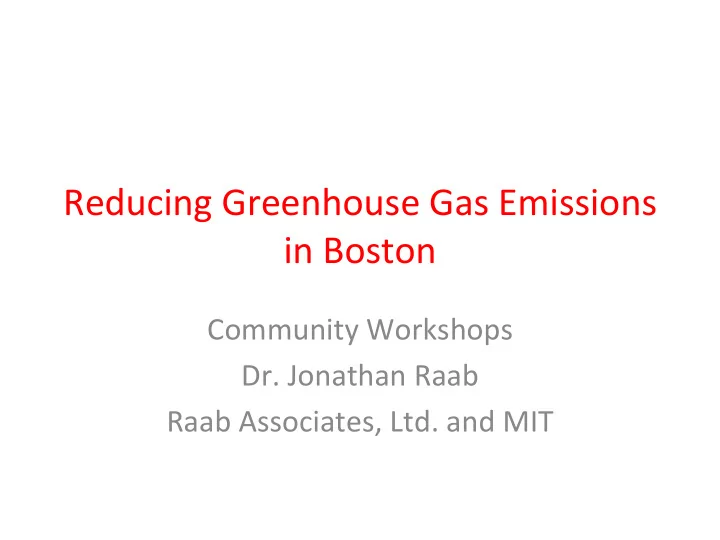

Reducing Greenhouse Gas Emissions in Boston Community Workshops Dr. Jonathan Raab Raab Associates, Ltd. and MIT
2 Boston 2008 GHG Inventory
Reducing GHG in Boston 2010 ‐ 2050 8.4 20% 6.3 25% Million Tons eCO 2 80% 1.7 1990 2010 2020 2050 3
Boston 2020 GHG Savings by Individual Programs 4 4
Boston 2020 GHG Savings by Primary Program Area 5 5
Boston 2020 GHG Savings by Sector 6 6
Climate Mitigation Policies and Programs for Boston ‐ Residential Buildings Building Codes/Stretch Code (M/B) “Cool” Roofs (B) LEED Requirements (B) Solar Boston (B) Renewable SBC (M) Utility Efficiency Programs /Renew Boston (M/B) Oil Efficiency Program (B) Key: F ‐ Federal R ‐ Regional M ‐ MA B ‐ Boston Color Key Appliance Standards (F/M) Existing Modify/Expand New/Proposed Green Lease (B) Single Stream Recycling (B) Pay As You Throw (B) Renewable Portfolio Standards (M) Separate Food Waste (B) Energy Rating & Labeling (B) 7 Residential Energy Conservation Ordinance (B)
Home Energy Efficiency Programs • Utility (electric and gas) Energy Efficiency Programs and Renew Boston – Up to $80 million/year for Boston residents and businesses by 2012 – Renew Boston help citizens participate in these programs • Oil/Propane Energy Efficiency Program – Seek funds to expand utility programs to cover homes heated by these fuels 8
Home Energy Efficiency Standards • Building Codes and Standards – Adopt the “stretch” energy code – Require LEED standards for new housing developments – Require “cool roofs” ‐‐ reflective, light ‐ colored roofs or vegetative roofs on new construction and roof replacement • Home Energy Labeling – Require all housing have an energy audit, rating, and energy label • Residential Energy Conservation Ordinance – By 2015, require all owner ‐ occupied and rental housing install basic energy efficiency measures before sale 9
Example EU Building Energy Certificate 10
Renewable Energy • Renewable Portfolio Standard (RPS) – MA requires that 15% of all electricity must come from new renewable energy resources (wind, solar, biomass) by 2020 • Renewable Energy Installations in Boston – Funds available for solar installations – Renew Boston/Solar Boston guidance 11
Solid Waste and Recycling • Single Stream Recycling – All recyclables can now be placed in a single container, separate from trash in Boston • Food Waste – Require that food waste be put in a separate bin so that it can be composted by the City • Pay ‐ As ‐ You ‐ Throw – Charge for each bag or container of trash thrown out (recylables and food waste would be free) 12
Climate Mitigation Policies and Programs for Boston ‐ Personal Automobile Parking Permit Low ‐ Carbon Fuels Car Sharing Program (B) Program (B) Renewable Fuel Standard (F) Ride Sharing Program (B) Low Carbon Fuel Standard (R) Efficient Cars: Café Standards (F) CA GHG Standards (M) Anti ‐ Idling Law (M) Promote Alternative Transportation Modes Key: F ‐ Federal R ‐ Regional M ‐ Massachusetts B ‐ Boston Color Key Biking Existing Walking Other Modes New/Proposed Mass Transit Modify/Expand 13 13
Overall Strategy to Reduce Greenhouse Gas Emissions From Cars • Reduce Automobile Use (Boston) – Promote alternative modes of travel (bikes, mass transit, walking, telecommuting) – Promote car sharing and ride sharing – Make driving more expensive/inconvenient • Promote More Efficient Driving and Car Maintenance Practices (Boston) • Federal and State Standards to Improve Car Efficiency • Federal and State Standards to Reduce Carbon Content of Fuels 14
Biking • Bike Lanes – Accelerate installation of bike lanes (currently 10 miles of bike lanes/year) • Bike Sharing – This spring City begins bike sharing program to grow to 3,000 bikes or more • Bike Infrastructure – Require commercial buildings and parking lots to provide bike parking – Evaluate network of shower and storage facilities for commuters – Increase number of bike cabs 15
Car Sharing • Background: One company currently has over 18,000 members in Boston, who, on average, drive 2,500 miles/year less • Goal: Every Boston resident should be within ¼ mile of a shared car by 2020 • Strategy: Work with car companies and community based organizations to promote car and ride sharing 16
Parking • Residential Parking Stickers – Currently no charge – Require an annual fee for stickers – Additional cars = higher fees • Parking Meters – Raise parking meter rates and increase hours • Use additional revenues to promote alternative means of travel 17
Behavior Changes Behavior change Reductions in Total Expected Boston 2020 Participation GHGs* Driving behavior 0.45% 25% 80% Low rolling resistance tires 0.38% Routine auto maintenance 0.24% 30% 30% Change HVAC air filters 0.22% Laundry temperature 0.15% 35% Thermostat setbacks 0.13% 35% Line drying 0.13% 35% Standby electricity 0.10% 35% 30% Tune up AC 0.04% Water heater temperature 0.03% 35% Total 1.9% Buildings Transportation *Derived from T. Dietz et al. "Household actions can provide a behavioral wedge to rapidly reduce U.S. carbon emissions," PNAS, 18452 ‐ 18456, November 3, 2009, www.pnas.org/cgi/doi/10.1073/pnas.0908738106 18
Boston Residential Greenhouse Gas (GHG) Saving Programs Measures GHG Savings in 2020 CAFÉ/State GHG Standards (F/M) 3.4% Behavior Change (buildings/transportation) (B) 1.9% Low Carbon Fuel Standard (transport/ heating fuels) (R/M) 1.5% Utility Energy Efficiency (electric/gas) / Renew Boston (M/B) 1.5% Mass Transit/Parking (B) 1.1% Appliance Standards (F/M) 0.6% Renewable Portfolio Standard (M) 0.5% Car Sharing (B) 0.5% Energy Efficiency Retrofit Ordinances (B) 0.4% Oil Heat Efficiency Program (B) 0.4% Bike Programs (B) 0.2% Residential Solid Waste Reduction (B) 0.2% Buildings Codes and Stretch Code (M/B) 0.1% Cool Roofs (B) 0.1% Benchmarking and Labeling (B) 0.1% Anti-idling (M) 0.02% Total 12.5% Color Key Buildings Transportation Behavior Change Existing New/Proposed Letter Key: (F) Federal, (R) Regional, (M) Massachusetts, (B) Boston 19 Modify/Expand
•What are your greatest concerns about climate change and Boston? •Thinking about the proposals to reduce greenhouse gas emissions, which make the most sense for Boston? •What else might the City do to reduce energy use and greenhouse gas emissions?
Recommend
More recommend